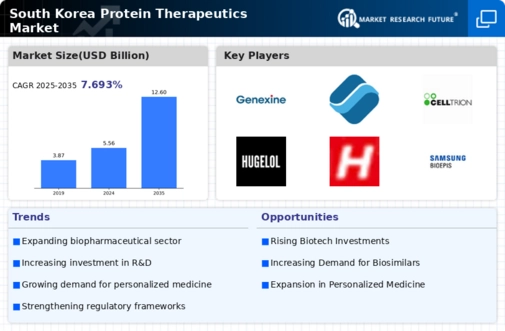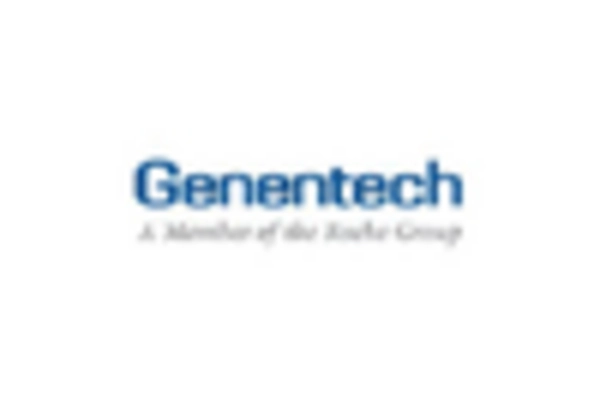Advancements in Biotechnology
Technological advancements in biotechnology are playing a crucial role in shaping the protein therapeutics market in South Korea. Innovations in protein engineering, gene editing, and monoclonal antibody development are enabling the creation of more effective and targeted therapies. For instance, the introduction of CRISPR technology has revolutionized the way proteins are designed and produced, leading to more efficient therapeutic options. As a result, the market is witnessing a shift towards personalized medicine, which is anticipated to account for a substantial share of the protein therapeutics market, potentially reaching $5 billion by 2025.
Rising Healthcare Expenditure
An increase in healthcare expenditure in South Korea is significantly impacting the protein therapeutics market. As the government and private sectors allocate more resources towards healthcare, there is a growing focus on advanced treatment options, including protein therapeutics. The healthcare expenditure in South Korea is projected to reach approximately 9% of GDP by 2025, which is likely to enhance access to innovative therapies. This trend suggests that the protein therapeutics market will benefit from increased funding and investment, potentially leading to a market valuation of $12 billion by 2028.
Supportive Government Policies
The South Korean government is actively promoting the growth of the protein therapeutics market through supportive policies and funding initiatives. Programs aimed at fostering innovation in the biotech sector, such as tax incentives and grants for research projects, are encouraging companies to invest in protein therapeutics. Furthermore, the government's commitment to enhancing healthcare infrastructure is likely to facilitate the faster adoption of new therapies. This supportive environment is expected to contribute to a robust growth trajectory for the protein therapeutics market, with projections indicating a market size of $8 billion by 2027.
Increasing Demand for Biologics
The protein therapeutics market in South Korea is experiencing a notable surge in demand for biologics, driven by the growing prevalence of chronic diseases such as cancer and diabetes. As healthcare providers increasingly recognize the efficacy of biologics in treating these conditions, the market is projected to expand significantly. According to recent estimates, the market for biologics in South Korea is expected to reach approximately $10 billion by 2026, reflecting a compound annual growth rate (CAGR) of around 8%. This increasing demand is likely to propel investments in research and development, thereby enhancing the overall landscape of the protein therapeutics market.
Growing Awareness of Precision Medicine
There is a rising awareness of precision medicine among healthcare professionals and patients in South Korea, which is positively influencing the protein therapeutics market. As patients become more informed about tailored treatment options, the demand for therapies that target specific genetic profiles is increasing. This shift towards precision medicine is expected to drive the development of novel protein therapeutics, enhancing treatment outcomes for various diseases. The market is likely to see a significant uptick in investment, with projections indicating that precision medicine could account for over 30% of the protein therapeutics market by 2026.
















